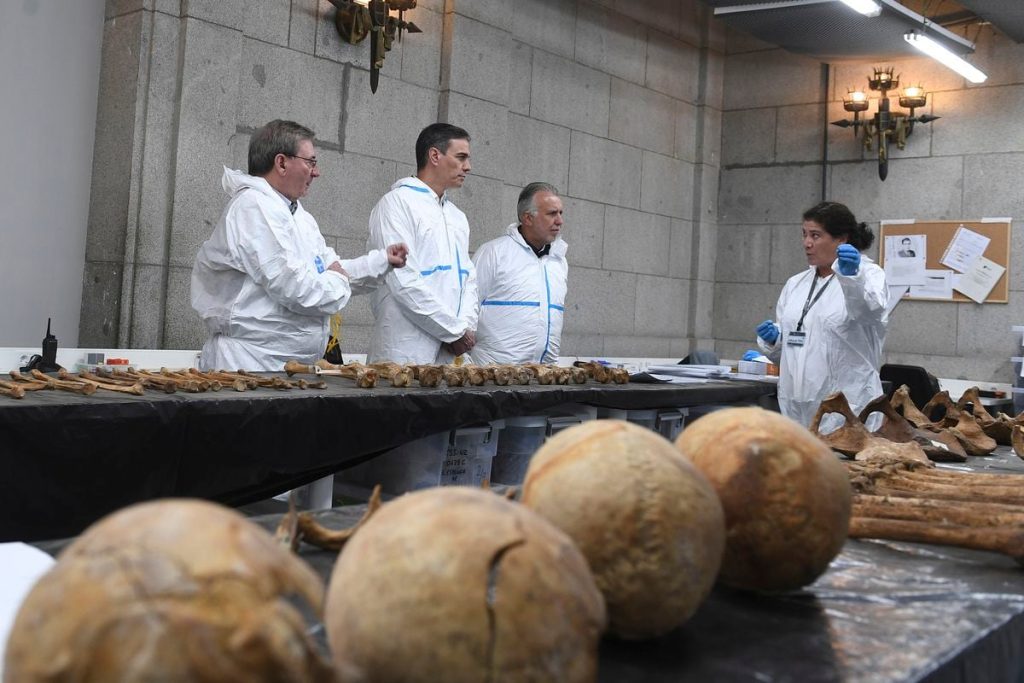The government is convinced that the decision of the PP and Vox to present memory laws in several autonomous regions that equate the Franco dictatorship with the democratic period of the Second Republic is a matter with deeper political implications than it may seem. The history of Spain is a very sensitive issue that continues to mobilize many citizens and puts the PP in an extreme position compared to its European counterparts, who would hardly accept laws that gloss over a fascist dictatorship like Franco’s. This issue, along with the proximity of the PP to Vox, was crucial in the elections of June 23 and may be so again, according to the analysis at La Moncloa.
Throughout the week, it has been clear that Pedro Sánchez and the PSOE are determined to take a strong stance on the issue of memory with an eye on the upcoming European elections, which the socialists will frame as a battle between left and right with the risk of a shift towards far-right positions in Europe, as Sánchez mentioned in a press conference during his trip to Jordan, Saudi Arabia, and Qatar, where he said that the anti-memory laws proposed by the PP and Vox show what was avoided on June 23. The government is determined to recover the successful formula of the 2023 elections, which pitted the progressive coalition against an ultra-conservative alliance between the PP and Vox that governs a significant part of the country and is making key decisions on memory issues.
This will be one of the campaign themes, as seen in Sánchez’s rally in Vitoria, where he stated that “the right and the far right are no longer distinguishable, they aim to rewrite history and equate democracy with dictatorship. They should know that nationally and internationally we will defend the dignity of the victims of Francoism and we will not allow them to trivialize the dictatorship.” The government is also concerned about the rise of positions that either glorify the dictatorship or deny democratic memory, especially among young people. They plan to launch a large campaign in 2025, the 50th anniversary of Franco’s death, to educate young people about the realities of Francoism, the Second Republic, and the contrast between democracy and fascist dictatorship.
The government is setting up an interministerial commission with experts to generate ideas for this campaign aimed at reaching all young people. Given the political stance taken by the regions and municipalities governed by the PP and Vox, the government will not be able to rely on them. However, a central element of the campaign will be to promote activities related to Francoism and the loss of freedoms in secondary schools, to ensure that the youth understand the significance of the liberties they enjoy today compared to the restrictions under the dictatorship that some are now trivializing.
By the end of 2024, a major exhibition titled “Students Against Franco” is being prepared, along with others focusing on historical memory and the victims of Francoist repression. The government will seek collaboration from various administrations and organize round tables on the role of the press, women, intellectuals, cinema, and theater in the anti-Franco struggle. They plan to tap into all available resources and enlist experts across disciplines to reinforce the control and enforcement of the 2022 democratic memory law, which the PP and Vox reject but are obligated to uphold.
A central aspect of this campaign will address the Valley of the Fallen, a site associated with Franco’s dictatorship, now called Cuelgamuros. Sánchez has already ordered the removal of Franco’s remains from this mausoleum and the exhumation of other victims buried there without consent. The government plans to reclassify Cuelgamuros as a center for educating the public about the horrors of the dictatorship, similar to institutions like the ESMA in Argentina that detail the mechanisms of repression under past regimes. The government is committed to prioritizing historical memory as a central issue in 2025, a significant year in Spain’s history.















